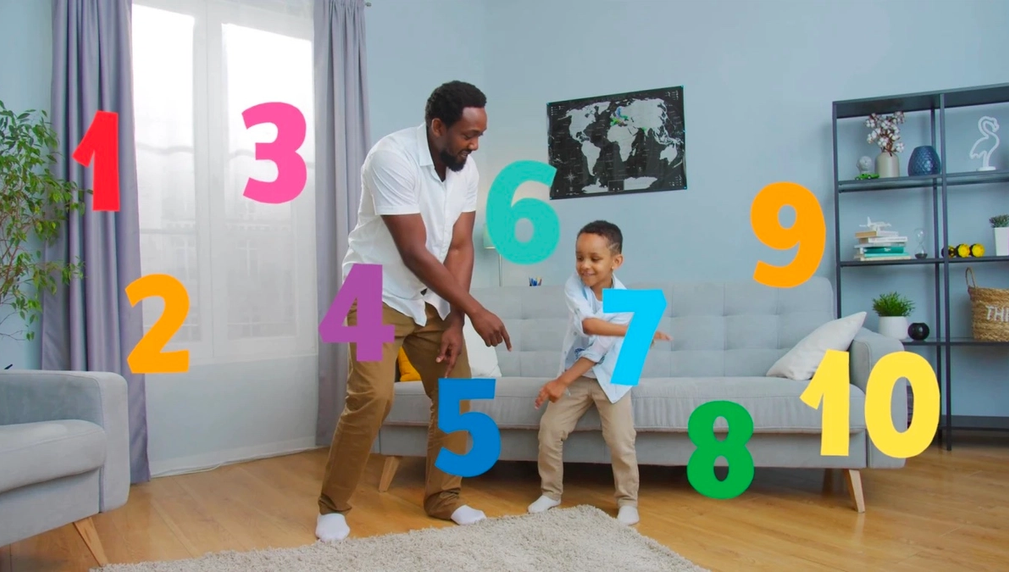PBS SoCal’s Family Math Program
PBS SoCal’s Family Math Program (FM) focuses on helping children ages 2-5 to master math at a young age, because these skills are key to success later in life. FM aims to improve mathematical school readiness for children from historically underserved, low-income, and Spanish speaking LA communities. In partnership with LA schools and nonprofits, PBS SoCal provides free, bilingual, and culturally-relevant resources and training that empower parents to become their child’s first math teacher because learning starts at home.

What is the primary issue area that your application will impact?
K-12 STEAM Education
In which areas of Los Angeles will you be directly working?
Central LA
East LA
South LA
Antelope Valley
County of Los Angeles
City of Los Angeles
LAUSD (select only if you have a district-wide partnership or project)
Other:: Orange County
In what stage of innovation is this project, program, or initiative?
Expand existing project, program, or initiative
What is your understanding of the issue that you are seeking to address?
In CA there is a critical need for early math intervention services. More than 1.5M CA families include infants and toddlers, but only 38% of eligible children are enrolled in preschool. In 2019, only 40% of CA’s K-12 students were proficient in math. The pandemic continues to increase these barriers to access. In 2021 the USC Rossier School of Education reported that achievement rates for underserved children had fallen by 10%. In Compton, one of FM’s partner communities, 68% of families identify as Latinx, 21% live below the poverty level, and young children too frequently fall behind. Fewer than 10% can count to 10 in preschool and ELL students often lack academic support in their native language. On average CUSD’s public elementary school ranking is 4/10 (bottom 50% CA schools) and math proficiency is 33% (vs. 41% statewide). FM’s family engagement program is an essential service for combatting these early learning barriers and ensuring success for LA’s most vulnerable children.
Describe the project, program, or initiative this grant will support to address the issue.
In 2019, PMGSC launched a needs assessment amongst its partners that identified a demand for services to bridge the gap in early learning mathematics and pointed to Compton as the ideal pilot community for Family Math (a math-centric version of its ongoing STEM-focused work). FM’s evidence-based, direct-service model of engaging families in the learning of their young children has proven an effective approach to developing early math skills. Highlights from year-round FM services: - Introductory Workshops: 4-week series that helps parents gain confidence and create fun math experiences for their children. - Parent Academy: 5-week series that dives deeper into essential pre-K math concepts including sorting and collecting, number sense and counting, patterns, and shapes. - Family and Community Learning Workshops: 4-week series that brings parents and children together to engage in learning experiences that foster collaboration, communication, and problem-solving skills. - Digital Parent Academy: 5-part modular series that creates a self-paced learning experience for parents around early math concepts. - Events: FM Storytime, FM Night, Kids Camps, and more. - Digital and Physical Resources: culturally relevant articles, short videos, learning guides, monthly newsletter highlighting early math concepts, social media posts, take-home FM backpacks filled with books and items to facilitate at-home math learning, and more.
Describe how Los Angeles County will be different if your work is successful.
Educational challenges facing families during the pandemic is reinforcing the need for equitable access to quality early learning programs. In response, the FM movement continues to grow. In FY22: - 61 workshops and events reached 1,068 parents, 548 children, and 81 educators; - 32 virtual workshops reached 570 parents and 249 children; - 19 outreach events (FM Nights, Storytimes, Camps, and Parent Happy Hours) reached 409 parents and 270 children; and - 1 FM Family Community Learning Workshop reached 43 parents, 61 children, and 2 providers. Cross-sector collaboration is essential to FM’s immediate and long-term impact. Partnerships with CBOs (Children’s Institute, Crystal Stairs, CUSD, Compton Library, and SHIELDs) identify pressing needs and connect families with FM. In the long run, FM could decrease the achievement gap, increase graduation rates in underserved communities, ensure LA County’s economic competitiveness, and strengthen education policy.
What evidence do you have that this project, program, or initiative is or will be successful, and how will you define and measure success?
FM program evaluation primarily takes the form of pre-and post-tests that assess if there is a statically significant difference in parents’ math positivity and confidence in guiding their child's curiosity before and after participating in FM. FY22 evaluation findings after attending FM workshops and academies revealed: -75% of parents were more confident in their ability to have conversations that involve math while doing everyday activities with their child; -100% of parents had more positive feelings toward helping their child with math; and -75% of parents were more confident in their ability to support their child’s math skills at home. Participant testimonials also speak to program impact. One parent shared how: “I learned that mathematics can easily be kept in mind in daily life as when eating a cookie, when preparing a sandwich, or by looking at the shapes of our entire home. I had not thought of putting mathematics into practice that way.”
Approximately how many people will be impacted by this project, program, or initiative?
Direct Impact: 23,775
Indirect Impact: 975